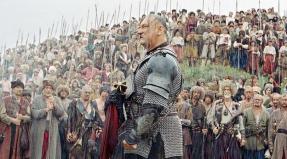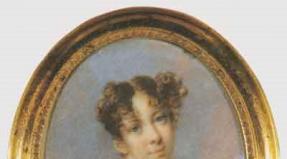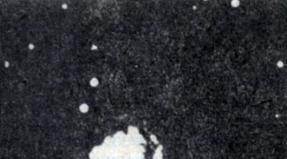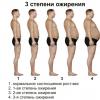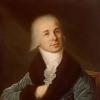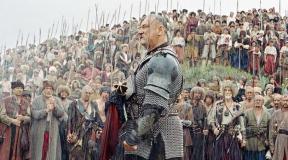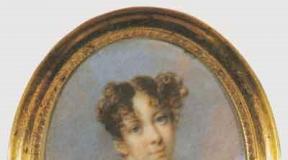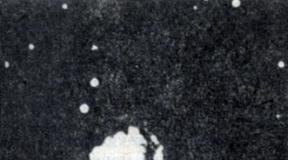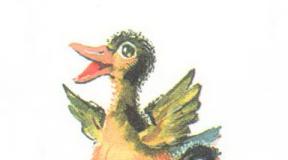What kind of character was Derzhavin? Interesting facts about Derzhavin. Structural analysis of the poem
The “angry ode”, born from the pen of Gabriel Romanovich Derzhavin, shocked Russia at the end of the 18th century. Gabriel Romanovich, who had extensive experience serving the state in high ranks, was so struck by lawlessness and injustice that he poured out all his indignation in an ode to “Rulers and Judges.” This work received a huge public response and shook the author’s stable position.
This was probably due to the fact that France was then shaken by revolutionary slogans, which were based on the paraphrased Psalm 81.
The main theme of the poem
The first version of the ode was called "Psalm 81". This is due to the fact that this psalm, written by King David, served as the basis for the work.
Derzhavin addresses his poem to officials, calling them “earthly gods.” He asks them how long this lawlessness will continue. He threatens them with punishment from higher powers. He is trying to convey to them that there is no significant difference between them and other people. All are mortal and all are equal before the Lord. Derzhavin calls for following the same laws of justice for everyone.
The semantic content of the ode can be divided into two parts. In the first, Gabriel Romanovich explains what exactly those in power should do. He explains their role and responsibilities to the common people. The second part is accusatory in nature. In it, the author points out the indifference and corruption of power. He prophesies a higher court for the guilty, where their bribes will not solve anything. Derzhavin does not take on the role of Judge, he only reminds the “blind” of His supreme justice.
His appeal is similar to both harsh reprimand of disobedient children and the powerless cry of a loving father at the same time. His angry lines embarrassed not only those around him, but also the empress, who was quite favorable towards the poet. Even Catherine saw revolutionary motives in the ode, which the author did not even think of putting into it.
Structural analysis of the poem
Derzhavin was an innovative poet of his time. "To Rulers and Judges" was written in a manner typical of him, but very progressive for that era. The author himself calls his work an angry ode. But it would be more accurate to call it a spiritual ode, since it is based on one of the main religious treatises - the Psalter. In addition, Gavriil Romanovich uses exclamations and vocabulary typical of this style. Particular solemnity is given to the work not only by the use of Slavicisms, but also by frequent appeals, rhetorical questions and exclamations. Anaphors and syntactic repetitions make the text of the poem more intense.
The poet creates vivid images of the victims of his exposure - officials who are corrupt and blind to the troubles of the people. The work has a special sound that attracts the listener's attention from the first lines. It is simply impossible to recite it quietly and unemotionally. The special system itself brings the speaker to the desired level of expression.
Conclusion
Derzhavin, who so vehemently accused officials, sincerely believed in the integrity of the Empress. He believed that the august person was surrounded by deceitful flatterers and Catherine simply did not know the real state of affairs.
It’s sad to realize that the work written by Derzhavin almost three centuries ago is still relevant today. The ode, which caused a lot of anger and gossip, unfortunately, did not change the situation in any way.
- Who does Derzhavin address in the poem “Rulers and Judges”? What is the nature of this appeal (reproof, command, glorification)?
- How does Derzhavin understand the purpose of rulers, “earthly gods”?
- What is the real appearance of “rulers and judges”? Does he correspond to the poet's idea of an enlightened statesman?
- What feelings does the author experience, what is his personal attitude towards the addressees and in what words is it expressed?
- In what style is the poem “To Rulers and Judges” written?
- Compare this poem with Lomonosov’s ode. What do you think are the similarities and differences between these two works?
The poem (arrangement of Psalm 81) sounds like a direct angry appeal to the “earthly gods,” i.e., kings and rulers. In contrast to the established literary tradition of praising the “earthly gods” in odes and other poetic works, Derzhavin not only brings them down from their pedestal, but also judges them, reminding them of their duties to their subjects. The poem contains both reproof and instruction (instruction).
Earthly rulers must, as Derzhavin asserts, strictly follow the laws, prevent their violation (“not look at the faces of the powerful”), protect the disadvantaged and poor from injustice (“protect the powerless from the strong”), take care about material needs and respect for civil rights, so that everyone is equal and united before the law.
In fact, the appearance of “rulers and judges” is very far from the classicist poet’s ideas about an enlightened statesman. With their connivance, atrocities and injustices occur, bribery flourishes. “Earthly gods” do not want to fulfill the duties assigned to them by the Almighty God. Derzhavin puts forward a very apt formula that reveals the basis of the activities of such a monarch, his attitude towards the lawlessness being committed: “They are not out of order! they see and don’t know! Covered with bribes of tow.” The insignificance of kings, their human weakness, their tendency to seduce us become especially noticeable thanks to the antitheses: an ideal sovereign is a real sovereign, a king is a slave:
Kings! I imagined that you gods have power, No one is a judge over you, But you, like me, are passionate And also mortal, like me. And you will fall like that, just as a withered leaf falls from the tree! And you will die just like your last slave will die!Does the poet hope to correct the evils of power?
No, Derzhavin does not harbor any hopes of correcting the evils of power. That is why he appeals to the Almighty to be “the only king of the earth” and to punish the crafty rulers and judges.
Indignation, contempt, irony towards earthly rulers. Even the expression “earthly gods” is perceived here as irony. Villainy, untruth, is covered with bribes, crafty is the vocabulary that characterizes the vices of those in power. At the same time, we hear in the poem a deep sorrow for the fate of the disadvantaged, who must be protected, “to tear the poor out of their shackles.” The poor, orphans, widows are the object of the author’s sympathy. He calls them righteous and turns to God: “God of the righteous,” on whom those in need of protection rely with prayer and hope. The arrangement of the psalm ends with an energetic appeal and prayer to punish the villains and become the only king of the earth. Material from the site
The poem is written in a high style, which is chosen by the author not to praise the reigning persons, but to denounce and demonstrate the high purpose of earthly power. Archaic vocabulary (risen, the Almighty, host, look, cover, tear out, comb, ripple, listen) gives solemnity to the expression of Derzhavin’s thoughts and feelings.
Similarities in understanding the purpose of supreme power: caring for subjects, observing the law, protecting from injustice; both Lomonosov’s odes and Derzhavin’s poem are full of teachings to monarchs. The difference is that Lomonosov, according to the laws of the odic genre, identifies progressive state ideas with the intentions of the reigning empress and her activities. Perhaps this is to some extent a wish, an image of what should be, what is ideal. But in Lomonosov’s odes we will not find Derzhavin’s denunciations of power.
Gavrila Romanovich Derzhavin (1743-1816) - an outstanding Russian poet of the 18th - early 19th centuries. Derzhavin's work was innovative in many ways and left a significant mark on the history of literature in our country, influencing its further development.
Life and work of Derzhavin
Reading Derzhavin’s biography, it can be noted that the writer’s early years did not indicate in any way that he was destined to become a great man and a brilliant innovator.
Gavrila Romanovich was born in 1743 in the Kazan province. The family of the future writer was very poor, but belonged to the noble class.
Early years
As a child, Derzhavin had to endure the death of his father, which further worsened the family’s financial situation. The mother was forced to do anything to provide for her two sons and give them at least some kind of upbringing and education. There weren’t many good teachers in the province where the family lived; we had to put up with the ones we could hire. Despite the difficult situation, poor health, and unqualified teachers, Derzhavin, thanks to his abilities and perseverance, was still able to receive a decent education.
Military service

While still a student at the Kazan gymnasium, the poet wrote his first poems. However, he never managed to finish his studies at the gymnasium. The fact is that a clerical error made by some employee led to the fact that the young man was sent to military service in St. Petersburg a year earlier, as an ordinary soldier. Only ten years later he managed to achieve the rank of officer.
With his entry into military service, Derzhavin’s life and work changed greatly. His duty of service left little time for literary activity, but despite this, during the war years Derzhavin composed quite a lot of comic poems, and also studied the works of various authors, including Lomonosov, whom he especially revered and considered a role model. German poetry also attracted Derzhavin. He knew German very well and translated German poets into Russian and often relied on them in his own poems.
However, at that time Gavrila Romanovich did not yet see his main calling in poetry. He aspired to a military career, to serving his homeland and improving the financial situation of his family.
In 1773-1774 Derzhavin participated in the suppression of the uprising of Emelyan Pugachev, but never achieved promotion or recognition of his merits. Having received only three hundred souls as a reward, he was demobilized. For some time, circumstances forced him to earn a living in a not entirely honest way - by playing cards.
Unlocking talent
It is worth noting that it was at this time, by the seventies, that his talent was truly revealed for the first time. "Chatalagai Odes" (1776) aroused the interest of readers, although creatively this and other works of the seventies were not yet completely independent. Derzhavin's work was somewhat imitative, in particular, of Sumarokov, Lomonosov and others. The strict rules of versification, to which, following the classicist tradition, his poems were subject, did not allow the author’s unique talent to fully reveal itself.
In 1778, a joyful event happened in the writer’s personal life - he fell passionately in love and married Ekaterina Yakovlevna Bastidon, who became his poetic muse for many years (under the name Plenira).
Own path in literature

Since 1779, the writer has chosen his own path in literature. Until 1791, he worked in the genre of odes, which brought him the greatest fame. However, the poet does not simply follow the classicist models of this strict genre. He reforms it, completely changing the language, which becomes unusually sonorous, emotional, completely different from what it was in measured, rational classicism. Derzhavin also completely changed the ideological content of the ode. If previously state interests were above all, now personal, intimate revelations are also introduced into Derzhavin’s work. In this respect, he foreshadowed sentimentalism with its emphasis on emotionality and sensuality.
Last years
In the last decades of his life, Derzhavin stopped writing odes; love lyrics, friendly messages, and comic poems began to predominate in his work.
Derzhavin's work in brief
The poet himself considered his main merit to be the introduction of the “funny Russian style” into fiction, which mixed elements of high and colloquial style and combined lyricism and satire. Derzhavin’s innovation was also in the fact that he expanded the list of themes of Russian poetry, including plots and motifs from everyday life.
Solemn odes
Derzhavin's work is briefly characterized by his most famous odes. They often contain the everyday and the heroic, the civil and the personal. Derzhavin's work thus combines previously incompatible elements. For example, “Poems for the birth of a porphyry-born youth in the North” can no longer be called a solemn ode in the classic sense of the word. The birth of Alexander Pavlovich in 1779 was described as a great event, all geniuses bring him various gifts - intelligence, wealth, beauty, etc. However, the wish of the last of them (“Be a man on the throne”) indicates that the king is a man, which was not typical for classicism. Innovation in Derzhavin's work manifested itself here in the mixture of civil and personal status of a person.
"Felitsa"

In this ode, Derzhavin dared to address the empress herself and argue with her. Felitsa is Catherine II. Gavrila Romanovich presents the reigning person as something that violates the strict classicist tradition that existed at that time. The poet admires Catherine II not as a statesman, but as a wise person who knows her path in life and follows it. The poet then describes his life. Self-irony when describing the passions that possessed the poet serves to emphasize Felitsa’s merits.
"To take Ishmael"
This ode depicts a majestic image of the Russian people conquering a Turkish fortress. Its power is likened to the forces of nature: an earthquake, a sea storm, a volcanic eruption. However, she is not spontaneous, but submits to the will of the Russian sovereign, driven by a feeling of devotion to her homeland. The extraordinary strength of the Russian warrior and the Russian people in general, his power and greatness were depicted in this work.

"Waterfall"
In this ode, written in 1791, the main image is of a stream, symbolizing the frailty of existence, earthly glory and human greatness. The prototype of the waterfall was Kivach, located in Karelia. The color palette of the work is rich in various shades and colors. Initially, this was just a description of the waterfall, but after the death of Prince Potemkin (who died unexpectedly on the way home, returning with victory in the Russian-Turkish war), Gavrila Romanovich added semantic content to the picture, and the waterfall began to personify the frailty of life and suggest philosophical thoughts about various values. Derzhavin was personally acquainted with Prince Potemkin and could not help but respond to his sudden death.
However, Gavrila Romanovich was far from admiring Potemkin. In the ode, Rumyantsev is contrasted with him - that’s who, according to the author, is the true hero. Rumyantsev was a true patriot, caring about the common good, and not personal glory and well-being. This hero in the ode figuratively corresponds to a quiet stream. The noisy waterfall is contrasted with the inconspicuous beauty of the Suna River with its majestic and calm flow, waters full of clarity. People like Rumyantsev, who live their lives calmly, without fuss or boiling passions, can reflect all the beauty of the sky.

Philosophical odes
The themes of Derzhavin’s work continue with the philosophical “On the Death of Prince Meshchersky” (1779) was written after the death of the heir Paul. Moreover, death is depicted figuratively, it “sharpens the blade of the scythe” and “grinds its teeth.” Reading this ode, at first it even seems that this is a kind of “hymn” to death. However, it ends with the opposite conclusion - Derzhavin calls on us to value life as “an instant gift from heaven” and to live it in such a way as to die with a pure heart.
Anacreontic lyrics
Imitating ancient authors, creating translations of their poems, Derzhavin created his miniatures, in which one can feel the national Russian flavor, life, and describe Russian nature. Classicism in Derzhavin’s work underwent its transformation here too.
Translating Anacreon for Gavrila Romanovich is an opportunity to escape into the realm of nature, man and everyday life, which had no place in strict classicist poetry. The image of this ancient poet, despising light and loving life, was very attractive to Derzhavin.
In 1804, Anacreontic Songs were published as a separate edition. In the preface, he explains why he decided to write “light poetry”: the poet wrote such poems in his youth, and published them now because he left the service, became a private person and is now free to publish whatever he wants.
Late lyrics

A feature of Derzhavin’s creativity in the late period is that at this time he practically stopped writing odes and created mainly lyrical works. The poem "Eugene. Life of Zvanskaya", written in 1807, describes the daily home life of an old nobleman living in a luxurious rural family estate. Researchers note that this work was written in response to Zhukovsky’s elegy “Evening” and was polemical to the emerging romanticism.
Derzhavin’s late lyricism also includes the work “Monument”, filled with faith in the dignity of man despite adversity, life’s vicissitudes and historical changes.
The significance of Derzhavin's work was very great. The transformation of classicist forms begun by Gavrila Sergeevich was continued by Pushkin, and later by other Russian poets.
Derzhavin develops the traditions of Russian classicism, being a successor to the traditions of Lomonosov and Sumarokov.
For him, the purpose of a poet is to glorify great deeds and censure bad ones. In the ode “Felitsa” he glorifies the enlightened monarchy, which is personified by the reign of Catherine II. The intelligent, fair empress is contrasted with the greedy and selfish court nobles:
You just won’t offend the only one,
Don't insult anyone
You see the foolishness through your fingers,
The only thing you can’t tolerate is evil...
The main object of Derzhavin’s poetics is man as a unique individual in all the richness of personal tastes and preferences. Many of his odes are philosophical in nature, they discuss the place and purpose of man on earth, the problems of life and death:
I am the connection of worlds existing everywhere,
I am an extreme degree of substance;
I am the center of the living
The trait is the initial of the deity;
My body is crumbling into dust,
I command thunder with my mind,
I am a king - I am a slave - I am a worm - I am a god!
But, being so wonderful, I
Where did it happen? - unknown:
But I couldn’t be myself.
Ode "God", (1784)
Derzhavin creates a number of examples of lyrical poems in which the philosophical tension of his odes is combined with an emotional attitude to the events described. In the poem “Snigir” (1800), Derzhavin mourns the death of Suvorov:
Why are you starting a war song?
Like a flute, dear bullfinch?
With whom will we go to war against Hyena?
Who is our leader now? Who is the hero?
Where is the strong, brave, fast Suvorov?
Severn thunder lies in the grave.
Before his death, Derzhavin begins to write an ode to THE RUIN OF HONOR, from which only the beginning has reached us:
R eka of time in its aspiration
U carries all people's affairs
AND drowns in the abyss of oblivion
N nations, kingdoms and kings.
A if anything remains
H sounds of the lyre and trumpet,
T about eternity will be devoured
AND common fate will not escape!
Derzhavin develops the traditions of Russian classicism, being a successor to the traditions of Lomonosov and Sumarokov.
For him, the purpose of a poet is to glorify great deeds and censure bad ones. In the ode “Felitsa” he glorifies the enlightened monarchy, which is personified by the reign of Catherine II. The intelligent, fair empress is contrasted with the greedy and selfish court nobles: You are the only one who does not offend, You do not offend anyone, You see through foolishness, Only you do not tolerate evil...
The main object of Derzhavin’s poetics is man as a unique individual in all the richness of personal tastes and preferences. Many of his odes are of a philosophical nature, they discuss the place and purpose of man on earth, the problems of life and death: I am the connection of worlds existing everywhere, I am the extreme degree of matter; I am the center of the living, the initial feature of the deity; I decay with my body in dust, I command thunder with my mind, I am a king - I am a slave - I am a worm - I am a god! But, being so wonderful, when did I come from? - unknown: But I couldn’t be myself. Ode "God", (1784)
Derzhavin creates a number of examples of lyrical poems in which the philosophical tension of his odes is combined with an emotional attitude to the events described. In the poem “The Snigir” (1800), Derzhavin mourns the death of Suvorov: Why do you start a war song like a flute, dear Snigir? With whom will we go to war against Hyena? Who is our leader now? Who is the hero? Where is the strong, brave, fast Suvorov? Severn thunder lies in the grave.
Before his death, Derzhavin begins to write an ode to the RUIN OF HONOR, from which only the beginning has reached us: The river of times in its rush carries away all the affairs of people and drowns peoples, kingdoms and kings in the abyss of oblivion. And if anything remains Through the sounds of the lyre and trumpet, It will be devoured by the mouth of eternity And the common fate will not leave!
Variety of creativity: Derzhavin did not limit himself to just one new type of ode. He transformed, sometimes beyond recognition, the odic genre in a variety of directions. Particularly interesting are his experiments in odes that combine directly opposite principles: laudable and satirical. This is exactly what his famous ode “To Felice”, discussed above, was. The combination of “high” and “low” in it turned out to be quite natural precisely because the poet had already found the right artistic move. What came to the fore in the work was not an abstract, lofty state idea, but the living thought of a specific person. A person who understands reality well, is observant, ironic, and democratic in his views, judgments and assessments. G.A. said this very well. Gukovsky: “But here comes a praise for the Empress, written in the living speech of a common man, speaking about a simple and genuine life, lyrical without artificial tension, at the same time sprinkled with jokes, satirical images, features of everyday life. It was as if a laudatory ode and at the same time at the same time, a significant part of it was occupied as if by satire on the courtiers; but on the whole it was neither an ode nor a satire, but the free poetic speech of a person showing life in its diversity, with high and low, lyrical and satirical features intertwined - as they are. intertwined in reality, in reality."
Derzhavin's short lyric poems are also imbued with an innovative spirit. In epistles, elegies, idylls and eclogues, in songs and romances, in these lyrical genres smaller than the ode, the poet feels even more liberated from strict classicist canons. However, Derzhavin did not adhere to a strict division into genres at all. His lyric poetry is a kind of unified whole. It is no longer supported by the same genre logic, not by the strict norms that prescribed compliance: high theme - high genre - high vocabulary; low topic - low genre - low vocabulary. Until recently, such correspondences were necessary for young Russian poetry. Standards and models were required, in opposition to which there is always an impetus for the further development of poetry. In other words, more than ever there was a need for a starting point from which a great artist starts, looking for his own path.
The lyrical hero, uniting Derzhavin’s poems into one whole, is for the first time himself, a specific person and poet recognizable to readers. The distance between the author and the lyrical hero in Derzhavin’s “small” poetic genres is minimal. Let us remember that in the ode “To Felice” such a distance turned out to be much more significant. The Murza courtier, a sybarite and an idle lover, is not the hard worker Gavrila Romanovich Derzhavin. Although their optimistic outlook on the world, cheerfulness and complacency make them very similar. The poet’s lyrical poems are described with great accuracy in the book by G.A. Gukovsky: “In Derzhavin, poetry entered life, and life entered poetry. Everyday life, a genuine fact, a political event, walking gossip invaded the world of poetry and settled down in it, changing and displacing in it all the usual, respectable and legitimate relationships of things. Theme the poem received a fundamentally new existence<…>The reader must first of all believe, must realize that it is the poet himself who is talking about himself, that the poet is the same person as those who walk in front of his windows on the street, that he is not woven from words, but from real flesh and blood . Derzhavin’s lyrical hero is inseparable from the idea of the real author.”
In the last two decades of his life, the poet created a number of lyric poems in the Anacreontic spirit. He gradually moves away from the ode genre. However, Derzhavin’s “anacreontics” bears little resemblance to what we encountered in Lomonosov’s lyrics. Lomonosov argued with the ancient Greek poet, contrasting the cult of earthly joys and fun with his ideal of service to the fatherland, civic virtues and the beauty of female selflessness in the name of duty. Derzhavin is not like that! He sets himself the task of expressing in poetry “the most tender feelings” of a person.
Let's not forget that we are in the last decades of the century. On almost the entire literary front, classicism, with its priority of civil themes, is losing ground to sentimentalism, an artistic method and direction in which personal, moral, and psychological themes are paramount. It is hardly worth directly connecting Derzhavin’s lyrics with sentimentalism. This issue is very controversial. Literary scholars solve it in different ways. Some insist on the poet's greater proximity to classicism, others to sentimentalism. Author of many works on the history of Russian literature G.P. Makogonenko reveals clear signs of realism in Derzhavin’s poetry. It is only obvious that the poet’s works are so original and original that it is hardly possible to attach them to a strictly defined artistic method.
In addition, the poet’s work is dynamic: it changed within even one decade. In his lyrics of the 1790s, Derzhavin mastered new and new layers of poetic language. He admired the flexibility and richness of Russian speech, which, in his opinion, was so well adapted to conveying the most varied shades of feeling. Preparing a collection of his “Anacreontic poems” for publication in 1804, the poet stated in the preface about the new stylistic and linguistic tasks facing him: “For my love for the Russian word, I wanted to show its abundance, flexibility, lightness and, in general, the ability to express the most tender feelings that are hardly found in other languages."
Freely adapting the poems of Anacreon or Horace into Russian, Derzhavin did not at all care about the accuracy of the translation. He understood and used “Anacreontics” in his own way. He needed it in order to show Russian life more freely, more colorfully and in more detail, to individualize and emphasize the characteristics of the character ("character") of the Russian person. In a poem "In Praise of Rural Life" the city dweller paints in his imagination pictures of a simple and healthy peasant life:
A pot of hot, good cabbage soup,
A bottle of good wine,
Russian beer is brewed for future use.
Derzhavin's experiments were not always successful. He sought to embrace two disparate principles in a single poetic concept: public policy and the private life of a person with its everyday interests and concerns. It was difficult to do this. The poet is looking for what can unite the two poles of the existence of society: the instructions of the authorities and the private, personal interests of people. It would seem that he finds the answer - Art and Beauty. Rearranging in the poem “The Birth of Beauty” the ancient Greek myth about the emergence of the goddess of beauty Aphrodite from the sea foam (myth in Hesiod’s version - L.D.), Derzhavin describes Beauty as an eternal reconciling principle:
…Beauty
Instantly she was born from the waves of the sea.
And only she looked,
Immediately the storm subsided
And there was silence.
But the poet knew too well how real life works. A sober view of things and uncompromisingness were the hallmarks of his nature. And therefore, in the next poem “To the Sea,” he already questions that in the current “Iron Age” Poetry and Beauty will be able to prevail over the victoriously spreading thirst for wealth and profit. In order to survive, a person in this “Iron Age” is forced to become “harder than flint.” Where can one “get to know” Poetry, with Lyra! And love for a beautiful modern person is becoming more and more alien:
Are the eyelids now made of iron?
Are men harder than flints?
Without knowing you,
The world is not captivated by the game,
Alien to the beauties of goodwill.
In the last period of his creative work, the poet’s lyrics are increasingly filled with national themes, folk poetic motifs and techniques. The “deeply artistic element of the poet’s nature,” which Belinsky pointed out, emerges more and more clearly in it. Derzhavin created poems that were remarkable and very different in terms of genre, style, and emotional mood during these years. "Swallow" (1792), "My idol" (1794), "Nobleman" (1794), "Invitation to dinner" (1795), "Monument" (1796), "Khrapovitsky" (1797), "Russian girls" ( 1799), "Bullfinch" (1800), "Swan" (1804), "Confession" (1807), "Eugene. The Life of Zvanskaya" (1807), "River of Times..." (1816). And also “Mug”, “Nightingale”, “For Happiness” and many others.
Let us analyze some of them, paying attention first of all to their poetics, that is, that very, as the critic puts it, “deeply artistic element” of Derzhavin’s works. Let's start with a feature that immediately attracts attention: the poet's poems affect the reader with colorful, visible concreteness. Derzhavin is a master of paintings and descriptions. Let's give a few examples. This is the beginning of the poem "Vision of Murza":
On the dark blue ether
The golden moon floated;
In its silver porphyry
Shining from the heights, she
Through the windows my house was illuminated
And with your fawn ray
I painted golden glasses
On my varnish floor.
Before us is a magnificent painting with words. In the frame of the window, as if in a frame bordering a picture, we see a wonderful landscape: in the dark blue velvet sky, in “silver porphyry” the moon floats slowly and solemnly. Filling the room with a mysterious radiance, it draws golden reflection patterns with its rays. What a subtle and whimsical color scheme! The reflection of the lacquer floor combines with the fawn beam and creates the illusion of “golden glass”.
And here is the first stanza "Invitations to Dinner":
Sheksninsk golden sterlet,
Kaymak and borscht are already standing;
In decanters of wine, punch, shining
Now with ice, now with sparks, they beckon;
Incense flows from the incense burners,
The fruits among the baskets are laughing,
The servants do not dare to breathe,
There's a table around waiting for you;
The hostess is stately and young
Ready to lend a hand.
Well, is it possible not to accept such an invitation!
In a big poem "Eugene. Life of Zvanskaya" Derzhavin will bring the technique of picturesque colorfulness of the image to perfection. The lyrical hero is “at rest”; he has retired from service, from the bustle of the capital, from ambitious aspirations:
Blessed is he who is less dependent on people,
Free from debts and from the hassle of orders,
Doesn't seek gold or honor at court
And alien to all kinds of vanities!
It seems that there was a whiff of Pushkin’s verse from “Eugene Onegin”: “Blessed is he who was young from his youth...” Pushkin knew Derzhavin’s poems well and studied with the older poet. We will find many parallels in their works.
The colorfulness and visibility of the details of “Evgenia. The Life of Zvanskaya” is amazing. The description of the table set for dinner with “homemade, fresh, healthy provisions” is so specific and natural that it seems like you can reach out and touch them:
Crimson ham, green cabbage soup with yolk,
Ruddy yellow pie, white cheese, red crayfish,
That pitch, amber-caviar, and with a blue feather
There are motley pike there - beautiful!
In the research literature about the poet, there is even a definition of “Derzhavin still life.” And yet, it would be wrong to reduce the conversation only to naturalness, the naturalness of the everyday scenes and natural landscapes depicted by the poet. Derzhavin often resorted to such artistic techniques as personification, personification of abstract concepts and phenomena (that is, giving them material characteristics). In this way he achieved high mastery of artistic convention. The poet can’t do without her either! It enlarges the image and makes it especially expressive. In “Invitation to Dinner” we find such a personified image - it gives us goosebumps: “And Death is looking at us through the fence.” And how humanized and recognizable Derzhavin’s Muse is. She “looks through the crystal window, mussing her hair.”
Colorful personifications are already found in Lomonosov. Let's remember his lines:
There is Death between the Gothic regiments
Runs, furious, from formation to formation
And my greedy jaw opens,
And he stretches out his cold hands...
However, one cannot help but notice that the content of the personified image here is completely different. Lomonosov's image of Death is majestic, monumental, its lexical design is solemn and pompous (“opens”, “stretches”). Death has omnipotence over formations of warriors, over entire regiments of troops. In Derzhavin, Death is likened to a peasant woman waiting behind the fence for her neighbor. But it is precisely because of this simplicity and ordinariness that a feeling of tragic contrast arises. The drama of the situation is achieved without high words.
Derzhavin is different in his poems. His poetic palette is multicolored and multidimensional. N.V. Gogol persistently searched for the origins of the “hyperbolic scope” of Derzhavin’s creativity. In the thirty-first chapter of “Selected Passages from Correspondence with Friends,” which is called “What, finally, is the essence of Russian poetry and what is its peculiarity,” he writes: “Everything about him is large. His syllable is as large as anything else.” Which of our poets, if you dissect it with an anatomical knife, you will see that this comes from an extraordinary combination of the highest words with the lowest and simplest, which no one would have dared to do except Derzhavin. in one place about the same majestic husband of his, at that moment when he had already fulfilled everything that was needed on earth:
And death awaits as a guest,
Twisting his mustache, lost in thought.
Who, besides Derzhavin, would dare to combine such a thing as the expectation of death with such an insignificant action as twirling a mustache? But how much more palpable is the appearance of the husband himself through this, and what a melancholy-deep feeling remains in the soul!
Gogol is undoubtedly right. The essence of Derzhavin’s innovative style lies precisely in the fact that the poet introduces the truth of life into his works, as he understands it. In life, the high coexists with the low, pride with arrogance, sincerity with hypocrisy, intelligence with stupidity, and virtue with meanness. Life itself is adjacent to death.
The conflict of the poem is formed by the collision of opposite principles "Nobleman". This is a large lyrical work of odic form. It has twenty-five stanzas of eight lines each. A clear rhythmic pattern formed by iambic tetrameter and a special rhyme scheme (ababvggv) is consistent with the genre tradition of the ode. But the resolution of the poetic conflict is not at all in the tradition of the ode. The plot lines in the ode, as a rule, do not contradict one another. In Derzhavin they are conflicting, opposite. One line - a nobleman, a person worthy of both his title and his destiny:
The nobleman must be
The mind is sound, the heart is enlightened;
He must set an example
That his title is sacred,
That he is an instrument of power,
Support for the royal building.
His whole thought, words, deeds
There must be benefit, glory, honor.
The other line is the nobles-donkey, who will not be adorned with either titles or orders (“stars”): The donkey will remain a donkey, Although you shower him with stars; Where he should act with his mind, He only flaps his ears. ABOUT! In vain is the hand of happiness, Against the natural rank, Dressing up a madman as a master Or as a fool's cracker.
It would be in vain to expect from the poet a psychological deepening of the stated conflict or authorial reflection (that is, analytical reflections). This will come to Russian poetry, but a little later. In the meantime, Derzhavin, perhaps the first of the Russian poets, is paving the way for depicting the feelings and actions of people in their everyday lives.
On this path, the very “Russian bend of the mind” that Belinsky spoke about helped the poet a lot. The poet's beloved friend and wife died. To relieve the melancholy at least a little, Derzhavin in the poem "On the death of Katerina Yakovlevna" turns as if for support to the rhythm of folk lamentations:
No sweet-voiced swallow
Homely from the wild -
Oh! my dear, beautiful,
She flew away - joy with her.
Not the moon's pale glow
Shines from a cloud in terrible darkness -
Oh! her body lies dead,
Like a bright angel in a deep sleep.
The swallow is a favorite image in folk songs and lamentations. And no wonder! She builds a nest near human habitation, or even behind closed doors. She is next to the peasant, touches him and makes him happy. With its homeliness, neatness and affectionate chirping, the “sweet-voiced swallow” reminds the poet of his dear friend. But the swallow is cheerful and busy. And nothing can awaken my dear one from a “sound sleep.” The poet’s “broken heart” can only cry out his bitterest sadness in verses that are so similar to folk lamentations. AND parallelism technique with the natural world in this poem could not be more impressive and expressive.
Derzhavin citizen and poet. Derzhavina. Derzhavin's path in service and in literature is special even for the age of personalities. Derzhavin’s mother sent him to a gymnasium that had just opened in Kazan, but due to a mistake by the clerks, he was forced to go into military service without completing his studies.
Share your work on social networks
If this work does not suit you, at the bottom of the page there is a list of similar works. You can also use the search button
G.R. DERZHAVIN
1. Outline of the life and creative path of G.R. Derzhavin citizen and poet.
2. The poetic world of G.R. Derzhavina.
...a great, brilliant Russian poet who was a true echo of the life of the Russian people, a true echo of the century of Catherine II.
V.G. Belinsky
1. Gavrila Romanovich Derzhavin (1743-1816) was the first of the Russian writers to recognize himself as a national poet, Russian not only in language, but, most importantly, in thinking, in"Russian mentality", according to "philosophy" , as he himself said. Derzhavin’s path in service and in literature is special even for the “age of personalities.” Such qualities as immense ambition, indomitable energy of character and powerful poetic talent led to a fantastic career (from soldier to minister) for a small landed nobleman without court connections and made an inept rhyme-maker without serious education the greatest poet of the era.
Derzhavin was born near Kazan in the family of an impoverished noble officer. The ancient family of nobles, the Derzhavins, originated from the Tatar Murza Bagrim. In famous"Notes" the poet wrote about his life that“... in infancy he was very small, weak and dry, so that, according to the lack of enlightenment and popular custom of that time in that region, he had to be baked in bread so that he would receive some living creatures", and: “... when in 1744 a large comet, very well known to the scientific world, appeared, when the baby first looked at it, pointing at it with his finger, he uttered the first word: “God!”" I learned to read by the age of 4, and then to write." from the clergy " Later, in Orenburg, he was taught German by the exiled German convict Rose, and mathematics by his father’s colleagues. At the age of 11, he lost his father. In 1759, Derzhavin’s mother sent him to a gymnasium that had just opened in Kazan, but due to a mistake by the clerks, he was forced to go into military service without completing his studies.
In 1762, former high school student Gabriel Derzhavin arrived from Kazan to St. Petersburg, to the Preobrazhensky Guards Regiment to serve, which became for him “Academy of Needs and Patience" This is where Derzhavin " educated himself " For 10 years he pulled a heavy soldier's burden. Only in 1772 did he receive the first officer rank of ensign. In 1773 he went to the active army that suppressed the Pugachev uprising. After the defeat of the rebels, he was not noted by Catherine II, and he himself achieved a reward: by submitting a petition to the empress, he received 300 souls of serfs in Belarus and the rank of captain-lieutenant.
During his military service in the guard, he began " scribbling verses » « no rules", but imitating Lomonosov and Sumarokov. In 1776 his first collection was published“Odes translated and composed at Mount Chitalagai in 1774”(“chitalagai” odes). The collection went unnoticed, but it was an important stage in Derzhavin’s creative development, in his awareness of his civic duty, understood as strict observance of laws, service “ holy truth ", the fight against abuses and abuse of power. Since 1777, Derzhavin switched to civil (state) service as an executor in the Senate and took up “finding yourself"in poetry.
On your own “special path” he joined in the late 1770s. largely due to the rapprochement with"Lviv circle"a group of young poets, composers, artists, connected by friendly relations and the commonality of new approaches in literature and art. Based on the ideological, aesthetic and poetic positions of the direct participants of the circle (N.A. Lvova, M.N. Muravyova, G.R. Derzhavin, V.V. Kapnista,
I.I. Khemnitsera, V.V. Khanykov and others) formed in Russian literature of the 18th century pre-romanticism . According to researcher V.A. Zapadov, in the works of the poets of the Lvov-Derzhavin community found embodiment “recognition of the primacy of inspiration as a source of poetic creativity and highlighting individuality, taken in the objective-real, concrete-sensory world surrounding it, two fundamental principles of pre-romanticism" 1 . Pre-romanticism placed individuality at the center of literature, but it does not have the individualism clearly expressed in romanticism, which turns into egoism and egocentrism. In pre-romanticism there is no such characteristic “romantic subjectivism”. Pre-Romanticism undoubtedly predetermined a new poetic vision of the world and Derzhavin’s innovative individual-autobiographical style, his “ confusion "(the poet gave this genre description of Derzhavin’s work
M.N. Muravyov), his " large syllable " (N.V. Gogol’s formula 2
), and ultimately led the poet to realism. At the end of the 1770s. he refused to follow Lomonosov's odic language, based on strict adherence to the gradual transitions within a certain text from Church Slavonicisms to Russian words and vice versa.
Derzhavin makes a revolution in poetry, as he destroys the classicist system of genres, denying the need for genre gradations, advocating the elimination of genre barriers in lyrics, and creates not impersonal lyrics, but ones connected with life, which revealed the inner world of the individual: for the first time, a person was able to express his feelings poetically. Derzhavin is the first in Russian literature to recognize himself as a Russian poet and declares his poetry as national poetry. He is the first of the Russian poets to write not about a person in general, but about a private person, including himself, and about private life, brilliantly combining« poetry with everyday reality of life"(Yu.M. Lotman). Plausibility in art ceases to be a dogma and is replaced by the requirement to maintain the natural naturalness of the image.
In September 1779, the magazine “St. Petersburg Bulletin”, one of the publishers of which was Ya.B. The prince, close to the Lviv circle, published the publication“Odes on the death of K. M. k***” ("On the death of Prince Meshchersky"), which marked a new page in Derzhavin’s lyrics, a clear confirmation of this was the following compositions:"Key" , “Poems for the birth of a porphyry-born youth in the North”, "To the first neighbor", "Arrangement of Psalm 81" ("To Rulers and Judges"). In them, and this was noted by all researchers of the poet’s work, features that were polemical in relation to the previous poetic tradition clearly appeared: a refusal to “imitate models,” a craving for autobiography, a love for material detail, for picturesqueness, for visually tangible images taken from everyday Russian life, an abundance of specific hints, attention to the spiritual world of a private person, etc.
The ode published in 1783 perfectly demonstrated the poet’s creative individuality"Felitsa" , to which he owes his all-Russian fame and rapid career. In 178488. Derzhavin first served as Olonets governor (in Petrozavodsk) and then (from 1785) as Tambov governor. Based on a denunciation, he was accused of abuses and put on trial by the Senate for abuse of power. The Senate acquitted him.
In 1791 he was appointed cabinet secretary of the empress. He is tasked with overseeing the legality of Senate decisions."I was bothering you" the empress with his zeal. Since 1793, Derzhavin has been a senator with the rank of Privy Councilor, awarded the Order of Vladimir, 2nd degree. Defending justice and fighting bribery, Derzhavin provokes a series of complaints: officials are outraged that“You can’t be with him”.
In 1794 he became president of the Commerce College. And here he launched a fight against abuses, which was followed by Catherine’s order: to be considered the president,"without interfering with anything"in fact, honorable retirement from business.
In 1794, Ekaterina Yakovlevna (nee Bastidon), the wife of the poet, his Plenira (Derzhavin used this conventional name to address her in poetry), died. He poured out his pain in a poem“On the death of Katerina Yakovlevna, which happened on the 15th day of July 1794”. In 1795 he married Daria Alekseevna Dyakova (1767-1842), whom he called Milena in poetry.
In 1800, Paul I appointed second minister at the State Treasury, a member of the State Council. For the successfully completed assignment of Paul to prevent famine in Belarus, he was awarded the rank of active privy councilor and the honorary commander's cross of the Order of Malta. After the assassination of Paul I, he demanded an investigation into the circumstances of the emperor's death.
Catherine's grandson Alexander I entrusted him with the post of Minister of Justice in 1802. But a year later, Derzhavin, a conservative in his political views, who believed that Russia did not need state reforms, but honest people who, holding high positions, would serve the people, and not their own selfish interests, was dismissed by the tsar with a reprimand“You serve too zealously”.
From 1803 until the end of his life, he remained a landowner who lived for a long time on his Zvanka estate on the Volkhov River in the Novgorod province, and a poet who did not depend on the authorities. Having achieved high ranks and titles without patrons or anyone's support, Derzhavin never changed his convictions, which are conveyed by his favorite phrase:
The human mind and heart
Were my genius
(“Confession”, 1807).
In 1804, Derzhavin’s collection was published"Anacreontic Songs". Throughout 1804-1814. he was studying dramaturgy: wrote tragedies (but only one “Herod and Mariamne” was staged, which was a success), texts for operas (“Dobrynya”, “John the Terrible, or the Conquest of Kazan”, etc.), as well as ― translations.
In 1808 they appeared"Explanations to Derzhavin's works...". “Explanations” became a continuation of the poet’s work on “with lengthy notes on incidents and all the hints of his odes"for the Novgorod vicar and bishop of Old Russia Evgeniy (in the world Evfimy Alekseevich Bolkhovitinov). Evgeny, who was compiling a dictionary of Russian writers, secular and spiritual, in 1805 asked Derzhavin through his friend D.I. Khvostov to provide autobiographical information, as well as “what kind of anecdotes about yourself and literature related" Derzhavin, who was retired from service, gladly fulfilled this request. According to
FROM. Serman, the true, deep reason for the appearance of the poet’s “notes”there was a feeling that Derzhavin had in 1804–1805 about the loss of contact with a new generation of writers and readers, and not Bolkhovitinov’s modest request to report his autobiography. <…>
Derzhavin’s notes as a whole indicate his intention to explain what might seem outdated to readers of the new era and turned his poetry into a monument of the past, into a picture of the past century, and what he himself considered in it timeless, strictly poetic, and therefore accessible to the perception of readers all eras" Having completed "Explanations", the poet began autobiographical"Notes..." (1812), where he focused mainly on describing his activities in the public sphere.
In 1811-1815 Derzhavin worked on“Discourse on lyric poetry, or ode”a final literary and theoretical treatise that summarized the enormous experience of the greatest Russian poet and the practice of all Russian poetry of the late 18th and early 19th centuries. It was a kind of teaching aid for"young writers", which provided useful information about the origin of lyric poetry, its history, theory and current state.
In January 1815, Derzhavin attended the final exam at the Tsarskoye Selo Lyceum; Pushkin read his poems in front of him.
In the last years of his life, Derzhavin took part in“Conversation of Lovers of the Russian Word”, which was headed by Admiral A.S. Shishkov author of the book “Discourse on the old and new syllable of the Russian language” (1803), ideological opponent of N.M. Karamzin, who did not recognize his “new style”, defended the idea of the superiority of the Church Slavonic language over modern Russian. The “Shishkovists” advocated the creation of a completely different style of Russian literature: not by imitating and adapting the Russian literary language to the norms and techniques of French literature of the 18th century, but on the basis of combining Church Slavonic bookishness with the poetics of folklore. Meetings of this society, which paid great attention to the development of national literature, were often held in Derzhavin’s house on Fontanka.
Three days before his death, Derzhavin began writing the ode “On Perishability” and did not have time to complete it. Remaining fragment"The river of times in its aspiration..."It is generally considered to be a completely autonomous poem, an example of a lyrical-philosophical miniature. This last poem by Derzhavin is an acrostic “RUIN OF CHŤI (i.e. HONOR)”:
R eka of time in its aspiration
U carries all people's affairs
AND drowns in the abyss of oblivion
N nations, kingdoms and kings.
A if anything remains
H sounds of the lyre and trumpet,
T about eternity will be devoured
AND common fate will not escape.
Derzhavin was buried in St. Petersburg, but in 1959 his ashes were transported to the Novgorod Kremlin and buried near the western wall of the St. Sophia Cathedral.
2. The innovative features of Derzhavin’s poetry first clearly appeared in the ode"On the death of Prince Meshchersky"(1779), in which the world of X is revealed VIII century:
1) this is a work of new poetic quality: in order to achieve individual expressiveness, it combines intonation, stylistic and content features of different genres - ode, elegy and friendly message;
2) the poem is written not in a 10-line stanza, traditional for a classicist ode, but in an 8-line stanza;
3) the ode is dedicated to the death not of an all-powerful nobleman, not of a statesman, not of a commander, but of a private person, an acquaintance of Derzhavin;
4) the poet addresses in the ode to the friend of the deceased Perfilyev, also a non-noble, private person;
5) in this poem, for the first time, the Russian reader is confronted with the image of a private person-author, Derzhavin himself (his “I” is a completely concrete, living poet with his personal sorrows and joys, reflections and deeds, with his private life).
Autobiographical motifs are introduced into the poem, which contains philosophical formulas of life and death discovered long before Derzhavin (“We are sliding on the edge of an abyss, / Into which we will fall headlong; / We accept our death with life, / We are born in order to die"), and it takes on a personal, individual character. The news of the unexpected death of a friend prompts the poet to think about the inevitability of death, the frailty of the world and his own fate:
Like a dream, like a sweet dream,
My youth has also disappeared,
Beauty is not very tender,
It's not so much joy that delights,
The mind is not so frivolous,
It’s not so much that I’m prosperous;
Tormented by the desire for honor,
Calling, I hear the noise of glory.
< … >
Go away, happiness, away, possible!
You are all constant and false here:
I'm standing at the door of eternity.
The poem on a general philosophical topic ends with the author’s reflection on his own life and a personal conclusion (in a hedonistic spirit) addressed to a friend:
This day or tomorrow to die,
Perfilyev! Of course we must,
Why should one be tormented and grieved?
That your mortal friend did not live forever?
Life is heaven's instant gift;
Arrange her for your peace
And with your pure soul
Bless the fates blow.
Derzhavin’s “recipe” is simple: if life is a gift, you need to use it wisely and spend these short days allotted by fate in peace of mind, with the consciousness of a clear conscience and fulfilled duty.
In one work, Derzhavin, who refused"pedantic sections of lyric poems"(i.e., from the division into genres and from the system of genres in general), connects not only a pathetic ode and a sad elegy, but also a friendly message, taking the path of eliminating genre barriers in the lyrics.
At the very beginning of the ode, the image of a clock appears, symbolizing the inevitable passage of time. In order to create the illusion of a measured, rhythmic chiming of the clock, Derzhavin resorts to sound recording (abundance of sonorous “l”, “n”):
G l a g o l time! metal is ringing!
Your terrible voice confuses me;
Calls me I am calling your hundred n,
Calls and arrives at the coffin l squeezes.
For him, an everyday phenomenon (the striking of a clock) acts as the voice of fate: everyday life and existence merge into one. A solemn address to the clock (in “high calm”) is replaced by an image of death, drawn in somewhat “lower” tones:
I barely saw this light,
Death is already gnashing its teeth,
Like lightning, the scythe shines
And my days are cut down like grain.
The image of death is very concrete, visually perceptible, “everyday”:
Where there was a table of food, there is a coffin;
Where the faces of feasts were heard,
The tombstones howl there,
And pale death looks at everyone.
Looks at everyone and at the kings,
For whom the world is too small for power;
Looks at the magnificent rich people,
What idols are in gold and silver;
Looks at the charm and beauty,
Looks at the sublime mind,
Looks at the forces of daring
And sharpens the blade of the scythe.
V.G. Belinsky wrote: “How terrible is his ode “On the Death of Meshchersky”: the blood runs cold in your veins, the hair, in Shakespeare’s words, stands on your head like an alarmed army, when the prophetic battle of the verb of times is heard in your ears, when in your eyes you see a terrible death toll with a scythe in your hands».
Innovative elements are even more evident in the ode"Key" (1779), where for the first time in Russian poetry nature appeared as an independent object of depiction and as a source of poetic inspiration. The ode was written in connection with the publication of the epic poem by M.M. Kheraskov "Rossiyada". In Derzhavin’s poem, a very real key, located in Kheraskov’s Grebenev estate near Moscow, is identified with the Kastal key, which was considered a source of poetic inspiration in Ancient Greece. The ode begins with an “antique beginning”, which turns into a series of magnificent pre-romantic paintings of the Grebenevsky key (at different times of the day). Stanza 7 outlines the essential elements and vocabulary of the night landscape (common in sentimentalist and romantic poetry):
ABOUT! if in the darkness of the night
Your appearance in the moonlight is pleasant,
How pale are the hills above you
And the groves sleep in silence,
And you alone, noisy, sparkle!
The form of the poem also corresponds to the spirit of antiquity: the last 5th verse in each stanza is white (unrhymed verse is a sign of ancient figurative structure and inspiration). This technique gives Derzhavin’s poem a sharply individualized form.
In 1779 Derzhavin wrote poetry“For the birth of a porphyritic youth in the North”, dedicated to the birth of Catherine II’s grandson, the future Alexander I, combining in them an ode and “light poetry”. Hence the genre designation of the work - “poems” (there was no such genre in classicism). This is a light, playful poem (joke (irony) is the main stylistic feature of Derzhavin’s new poetry), with elements of a fairy-tale plot, written in trochee (in song meter, and not in iambic tetrameter, traditional for an ode). It contains a direct polemic with Lomonosov. Mythological imagery was required in the ode. Derzhavin also begins his poems with a mythological image, but sharply reduces it, humanizing Boreas, the god of the north wind, talking about his deeds jokingly and jokingly:
With white Borey hair
And with a gray beard,
Shaking the skies
He squeezed the cloud with his hand;
Frost fluffy sprinkled
And raised blizzards,
Imposing chains on the icemen,
The waters are fast,
All nature shook
From a dashing old man;
Turned the earth into stone
His cold hand...
Derzhavin’s image of Borey (cf. Lomonosov’s “Ode ... 1747”: “Where with the frozen wings of the storm / Your banners flutter...") loses its allegorical character: with its help the poet depicts a genuine Russian winter (this is the first winter Russian landscape in Derzhavin’s poetry). With precise words, Derzhavin paints a reliable picture of nature, poetizing it. Derzhavin’s unique individuality is also revealed in the fact that instead of likening the future emperor to a mythological or historical hero, obligatory in classic odes, he expresses his heartfelt wishes to the newborn:
Be the master of your passions,
Be the man on the throne!
Derzhavin's personality is revealed in hiscivil verses. Derzhavin considered service and poetry as two fields "unified civil service"(V. Khodasevich). The social and didactic pathos of classicism will forever remain relevant for Derzhavin: “Being a poet by inspiration, I had to tell the truth; politician or courtier... I was forced to hide the truth with allegory and hints" The poet's enlightenment illusions and ideal ideas about the duty of the monarch and nobleman were reflected in two directions of his civil lyrics:satirical and accusatory And heroic-patriotic.
His first civil poem, published in the St. Petersburg Bulletin in 1780,"Oh yeah. Arrangement of Psalm 81". Based on the biblical text, where an appeal to kings is heard, Derzhavin does not declare the truth about the duty of monarchs, but formulates his understanding of their duties:
Your duty is to preserve the laws
And do not look at the nobility of persons,
Save from the hands of persecutors
The poor, the orphaned and the widows!
The poet adds:
They do not heed: robberies, deceits,
Torment and the poor moan
Confuse, shake kingdoms
And the throne is thrown into ruin...
Due to the accusatory tone and harshness of the satirical attacks, the authorities ordered the poem to be cut out from the magazine. Derzhavin had to prove that “he never had Jacobin thoughts" and find out " Why is this psalm written by King David considered such?" In 1787, the second edition of the arrangement of Psalm 81 appeared, which later became known as"To Rulers and Judges". In 1798, the ode was again removed from Derzhavin’s collection of poems. The reason for this is its preserved theme: the poet-prophet’s denunciation of the “earthly gods” who have forgotten about their human debt and "mortality":
Your duty: to save the innocent from harm,
Give cover to the unlucky;
To protect the powerless from the strong,
Free the poor from their shackles.
They won't listen! They see and don’t know!
Covered with bribes of tow:
Atrocities shake the earth,
Untruth shakes the skies.
Kings! I thought you gods were powerful,
No one is your judge
But you, like me, are passionate,
And they are just as mortal as I am.
And you will fall like this,
Like a withered leaf falling from the tree!
And you will die like this,
How your last slave will die!..
The ode is built on the ethical antithesis of those suffering"innocent" and those celebrating"unrighteous and evil". This is one of the best Russian civil poems. The Derzhavin tradition will be supported by Ryleev, Pushkin, Lermontov.
The technique of contrast formed the basis of the structure of Derzhavin’s program “ode” (ode-satire)"Nobleman" (1794). Its first part (19 stanzas) is the development of the ideas of Cantemir’s satire “On the envy and pride of the evil nobles. Filaret and Evgeniy" and Sumarokov's satire "On Nobility". One of the sources of Derzhavin’s ode could be an article from “The Hardworking Bee” by Sumarokov, “Letter on Dignity” (cf. “Our honor does not lie in titles. He is more radiant who shines with heart and mind, he is more excellent who surpasses other men in dignity, and he is a boyar who cares about the fatherland"). Derzhavin introduces the traditional opposition of satire between external and internal, false and true:
A donkey will remain a donkey
Although shower him with stars;
Where should one act with the mind,
He just flaps his ears.
ABOUT! the hand of happiness is in vain,
Against the natural rank,
Dresses up a madman as a gentleman
Or into the hype of a fool.
<…>
Leaving the scepter, the throne, the palace,
Having been a wanderer, in dust and sweat,
Great Peter, like some kind of god,
He shone with majesty at work:
Honored and in rags hero!
Catherine in low stakes
And not on the royal throne
She was a great wife.
<…>
...I am a prince since my spirit shines;
Owner since I have passions;
Bolyarin since I’m rooting for everyone,
Friend to the king, the law, and the church.
The nobleman must be
The mind is sound, the heart is enlightened;
He must set an example
That his title is sacred,
That he is an instrument of power,
Support for the royal building;
His whole thought, words, deeds
There must be benefit, glory, honor.
Part II (1018 stanzas) presents the “anti-ideal”, revealed in genre scenes: the nobleman indifferent and selfish“sardanapalus”, “sybarite” “sleeping peacefully” after “whimsical” lunch, while they are waiting for his participation"wounded hero", "widow" "old warrior on crutches", "lenders regiment". Derzhavin built a generalized satirical portrait of the nobleman on real material: in the actions of the nobleman denounced by the poet, one could recognize the features of the all-powerful favorites and dignitaries in the empire: Potemkin, Zubov, Bezborodko. The poetics of the “hint”, understandable to contemporaries, is a characteristic feature of Derzhavin’s individual poetic style.
In the third part (1925 stanzas) an expression of faith in the Russians is heard and images of the true sons of the fatherland, heroes of peaceful life and war are created (Yakov Dolgorukov - one of the figures of the era of Peter I, who fearlessly spoke the truth to the formidable king; an honest husband and commander Rumyantsev from contemporaries):
O Russian wakeful people,
Fatherly guardian of morals!
When the entire mortal race is relaxed,
What glory are you not involved in?
What kind of nobles do you not have?..
The ode ends on a bright note. It was first published after the death of Catherine, in 1798. With this poem in mind, Pushkin wrote in his “Message to the Censor”: “Derzhavin, the scourge of nobles, at the sound of the menacing lyre, / Their proud idols exposed" V. Khodasevich noted the moralistic orientation of Derzhavin’s civil poems, who sought not to castigate vice, but to encourage virtue.
Derzhavin, like Lomonosov, is a singer " greatness" (Russia, Russian weapons, national character) and “ quiet days" (peace). Lomonosov traditions are especially noticeable in the genre victorious odes . The portraits of Russian commanders captured in them (Suvorov, Rumyantsev, Repnin, Bibikov) are the embodiment of the author’s ideal of a warrior and a person.
Oh yeah "To take Ishmael"(1791) is dedicated to the capture by Russian troops on December 12, 1791, by storm, commanded by Suvorov, of the Turkish fortress of Izmail, which was considered impregnable. In this “poem” “battle-historiographical” ode, Derzhavin sang the courage of Russian soldiers, the power and greatness of the Russian people, who overthrew enemies in the past and who are destined to become the head of European countries and Slavic peoples in the future (guided by imperial psychology, belief in God's chosenness Russia); glorified “silence.” Derzhavin’s poetics of battleism is characterized by: “unpretentious” depiction of battle, dynamism; hyperbole and picturesquely grandiose comparisons with the elements as the main techniques for creating a collective image of Russian warriors “Rossa”; pre-romantic landscape; “musical” development of the theme of the assault: figurative and thematic repetitions, increasing tension, climax (images from the Apocalypse), contrasting theme (elegiac meditations on the destruction of wars).
Derzhavin’s favorite hero was A.V. Suvorov, who combined true heroism and humanity, the poet dedicated more than one poem to him: “On Suvorov’s stay in the Tauride Palace”, “On victories in Italy”, “On the crossing of the Alpine Mountains”, etc. The final work in the “cycle” about Suvorov ¶"Snigir" (1800), written on the death of Suvorov, who died on May 6, 1800. In the first publication, the poem had the title “To the bullfinch. After the death of Prince Suvorov." Derzhavin set himself a difficult artistic task: to depict a non-ceremonial portrait of a great man and people’s commander, expressing a deeply personal feeling (“Why do you start a war song / Like a flute, dear bullfinch?"), the pain of loss. He solved this problem by synthesizing stylistic means:
1 Who will be in front of the army, blazing,
2 Ride a nag, eat crackers;
3 Tempering the sword in cold and heat,
4 Sleep on straw, watch until dawn...
The first and third lines of this quote are in high style:"army" instead of “army” (“army” is an ancient Russian word and was not used in everyday speech already in the 18th century),"sword" instead of “sword” (swords were worn by ancient warriors; in the real army of the 18th century, officers wore swords), metaphor"blaze" (“to burn with soul”, “to glow with courage”) in the meaning of “to experience strong feelings.” This is how a classic poet could write. But in the second and fourth lines, pictures appear that are absolutely impossible from the point of view of classicism: the hero rides a nag (a bad, overfed horse), eats crackers, sleeps on straw - he is a man, just like the others. By mixing high and low vocabulary, Derzhavin recreated the living image of Suvorov.
The combination of satirical-accusatory and heroic-patriotic tendencies led Derzhavin to the destruction of the genre-style unity of the laudable ode in"Felitse" (1782). The poet himself attributed “Felitsa” to “this kind of writing that has never happened in our language before" Derzhavin’s idealization of the image of Catherine II (Felitsa) is combined with a critical attitude towards her nobles (Murzas), as a result of which the purity of the genre established by the classicists is sharply violated. The poem creates a portrait of a real person who embodies the moral and political ideal of Derzhavin - the man on the throne (in the image of Felitsa the principle of individualization is combined with idealization).
The name Felitsa (the name of the goddess of bliss, happiness, from lat. felicitas happiness) borrowed from"Tales of Prince Chlorus"Catherine II, written for her grandchildren. It told how the Kyrgyz khan, having kidnapped the Russian prince Chlorus, ordered him to find a rose without thorns - a symbol of virtue. Chlorus found her with the help of Khan's daughter Felitsa and her son Reason.
“Oriental” flavor, “funny style,” joke, “familiarity” are the leading style-forming principles, erasing the boundary between the Monarch and the Poet, affirming a new attitude to the subject of praise, disinterested and personal, but not removing the inner reverence. Image"Princesses of the Kyrgyz-Kaisak Horde"is revealed in a new way: through everyday life and simplicity of behavior, contrasting with the satirical image of the “Murz”. The result of the combination of affirmative and critical pathos is the two-dimensionality of the author’s “I”: 1) an odic poet chanting the virtues of an enlightened monarch; 2) a collective satirical image of a vicious nobleman of the court (not a mechanical sum of several “abstract” portraits; this principle of typification was characteristic of Kantemir’s satires and Novikov’s “Recipes”) In the image of Derzhavin’s Murza, the morals and hobbies of Catherine’s nobles are recreated: Prince G.A. . Potemkin (“And I, having slept until noon, / Smoke tobacco and drink coffee; /<…>/ Then suddenly, seduced by the outfit, / I gallop to the tailor wearing a caftan"and the next three stanzas); Count A.G. Orlova (“I'm flying on a fast runner», «
Or fist fighters / And I make my spirit happy with dancing"); graph
P.I. Panina ("Or I leave all my worries behind and go hunting / And amuse myself with the barking of dogs"); Jägermeister S.K. Naryshkina (“I amuse myself at night with the horns / And the rowing of daring oarsmen"); Prince A.A. Vyazemsky (“I read Polkan and Bova; / I sleep at the Bible, yawning"). Derzhavin concludes the story about Murza meaningfully: “That's it, Felitsa, I'm depraved! / But the whole world looks like me..." His contemporaries were impressed by his sharply satirical look at everyday phenomena and the daily activities of the Russian nobleman:
Or, sitting at home, I’ll play a prank,
Playing fools with my wife;
Then I get along with her at the dovecote,
Sometimes we frolic in blind man's buff;
Then I’m having fun with her,
Then I look for it in my head;
I like to rummage through books,
I enlighten my mind and heart,
I read Polkan and Bova;
Over the Bible, yawning, I sleep...
The language of Derzhavin’s ode is replete with colloquialisms (“shink”, “on one side”, “dancing”, “I’ll do a prank”, “playing fools”, “clackling”, “don’t dirty their faces”, etc.). “Felitsa” combines medium and low styles of friendly message and satire, and almost nowhere does Derzhavin’s ode rise to the high ornate “soaring” inherent in a canonical solemn (praise) ode. There is also no “attack” or “lyrical disorder” here. According to G.P. Makogonenko,"fundamentally anti-individualistic"an ode to classicism develops into“lyrics of an individual, really existing person”.
The poet and his right to speak freely, from the heart, by inspiration this is the cross-cutting motif of the “cycle” about Felitsa:"Gratitude to Felitsa" (1783), "Image of Felitsa"(1789), “Vision of Murza” (1783; 1791). In “The Vision of Murza,” written in defense against reproaches of flattery and literary attacks caused by “Felitsa,” Derzhavin proudly opposes himself to the flatterers as an incorruptible singer, immortal in his heartfelt praise of “crowned virtue” (this poem begins with a description of the night in Derzhavin’s apartment, conveying the poet’s individual vision of the surrounding things).
Disappointment with Catherine (in the early 1790s) prompted Derzhavin to question the meaning of his poetic activity and his right to immortality. In the message"Khrapovitsky" 1793 ( “Old comrade, neighbor again...”) he, responding to the advice of a friend and colleague to continue composing odes praising the “Kyrgyz mistress” Felitsa, frankly states: “Gods singer / There will never be a scoundrel" The writer Khrapovitsky, like Derzhavin, was at that time the empress’s secretary of state, and in the summer of 1793 they both lived in the Tsarskoe Selo palace. Khrapovitsky turned to Derzhavin with poems in which he essentially conveyed the command (or request) of Catherine II. But, as the “Notes…” testify, Derzhavin already “I couldn’t write such subtle praises to her,<…>which he wrote not when he was still at court: for from afar those objects that seemed divine to him and set his spirit on fire, appeared to him, as he approached the court, very human and even low and unworthy of the great Catherine, and so he cooled spirit that he could write almost nothing with a warm, pure heart in her praise.<…>she ruled the state and justice itself more according to politics or her views than according to sacred truth" Derzhavin became disillusioned not with the ideal, but with “human original with human weaknesses».
"Holy truth" was the sole subject of the ministry of Derzhavin Poet and official:
You yourself will judge over time
Me for the hazy incense;
For the truth you will honor me,
She is amiable to all ages;
In her crown
The royal face is lighter.
The poet dedicates his program poem to the theme of the memory of descendants"My idol" (1794), in which he reflects on the nature of fame, contrasts false glory with true values. The reason for writing the poem was the work of the sculptor J.-D. Rashetta creating a marble bust of Derzhavin. Strictly weighing your services to society and naming them"my trinkets" , the poet comes to the conclusion that he is not worthy of the signs of honor and recognition of his contemporaries. In his opinion, it is shameful to dream about them:
Wishes praise and thanksgiving
Only a low soul
Living from awards. ¶
After death glory is good;
Merits ripen in the grave,
Heroes shine in eternity.
Without "glorious deeds thundering in the world"According to Derzhavin, there is no glory, human memory and immortality. But glory to the Batyevs and Maratovs ("beastly souls fun") causes horror and disgust in him:
It's easy to make the world thunder with evil,
It’s only a step to Herostratus;
But it is difficult to glorify with valor
And reign in the hearts:
We must strive for a good age,
And time will give us one fruit:
To do evil, just to decide.
And it was done in an instant.
Derzhavin finds examples of true glory in Russian history. This is Peter I, and Alexey Mikhailovich, and Minin with Pozharsky, and Filaret, and Dolgorukov:
The image of heroes is more sacred to me,
My dear fellow citizens,
Before the throne, at trial, in the midst of battles
The soul of the great Russians;
Sacred!
Refusing claims to personal glory, the poet dreams of the future glory and power of his Fatherland, which will grow and increase through the labors and exploits of his faithful sons:
I am glad of the fatherland's bliss;
Give me more, heaven,
Russian strength to excellence
Sons faithful and direct to her!
Definitions of fate
Then they will be fulfilled in everything...
Rejecting the right to immortality for glorifying Felitsa, Derzhavin claims that posterity will honor his memory as the singer of Russia, the Russian people and its leaders, for upholding truth and virtue. And he ends his reflection with the exclamation:
What glory! Our direct happiness
To live with our conscience at peace.
In the poem "Monument" (1795), which is a reworking of Horace’s ode “To Melpomene,” Derzhavin takes credit for being the first “dared in a funny Russian style / to exclaim about the virtues of Felitsa, / to talk about God in heartfelt simplicity / And to speak the truth to kings with a smile", i.e. service to Truth in poetry and in life.
Derzhavin reflects in his poem about what gives a poet the right to immortality"Swan" (1805) imitation of Horace’s ode “To the Maecenas”:
Over time they will know about me
Slavs, Huns, Scythians, Chud,
And all that are blazing with abuse today,
They will point with their finger and recite:
“Here is the one flying, building a lyre,
He spoke in the language of the heart,
And preaching peace to the world,
I made everyone happy."
In antiquity, the swan, a symbol of light and poetry, was considered the bird of Apollo. According to Aristotle, the souls of poets after death turn into swans and retain the gift of poetic inspiration. For Derzhavin, the immortal soul and poetry of the singer of humanity are the guarantee of his posthumous life.
In Derzhavin’s lyrics, often next to the image of the author-private person in one context or another, the image of God appears or a mention of him as the main spiritual support. High and inspired " song to god » Derzhavin created in 1780-1784. It became the “theological” ode, which gained worldwide fame as the most popular Russian poem of the 18th century."God" . The “Notes” tells the story of the creation of the poem: “During February and March 3 He decided to go to the Belarusian villages, so that, having never seen them, he could examine them, make orders, or, to put it bluntly, as they were quitrents, there was no farming in them, then, secluded from the urban distraction, he would finish what he had started in them in solitude to them back in 1780, while in the palace at the all-night vigil on Easter Sunday, the ode “God” was given to them.<…>But, having reached Narva, noticing that the road was beginning to deteriorate and that in the village in the peasant huts it would be awkward for him to work on his writing, then, leaving the cart and people at the Yamsky inn, he rented a small chamber in the city from an elderly German woman, so that She also prepared food for him, finished that ode..." The materials of the “Notes” are supplemented by the author’s “Explanations on the works of Derzhavin,” which tells about the poet’s frantic creative impulse when writing the last stanza of the poem, ending “by the fact that he actually shed grateful tears for the concepts that were entrusted to him».
Regarding the first lines of the ode in “Explanations,” Derzhavin specified that “The author, in addition to the theological concept of our Orthodox faith, understood here three metaphysical faces, that is: infinite space, continuous life in the movement of matter and the endless flow of time, which God combines in himself" In Derzhavin’s largest philosophical poem, which provoked attacks from zealots of Orthodoxy and churchmen, the ideas of the contemporary science of the poet about the plurality of worlds were reflected and, along with God, they glorified “divine sonship of man"(V. Khodasevich), the Renaissance ideal of personality was essentially recreated: "You are and I am no longer nothing! /<…>/ I am the connection of worlds existing everywhere, / I am the extreme degree of matter, / I am the focus of living things, / The initial feature of deity; / I decay with my body in dust, / I command thunder with my mind, /I am a king, I am a slave, I am a worm, I am a god!».
Creatively synthesizing the traditions of Lomonosov (25 stanzas: grandiose pictures of the universe, the “immeasurable difference” of manifestations of the unknowable God) and Sumarokov (“mortality” of man), Derzhavin creates a new poetic plot: comprehension of the meaning of the connection between God, the Universe, Man and the affirmation of the divine nature person. The tragic paradox of human existence - the immortality of the soul and the perishability of the body - is overcome: a) by submission to the highest “truth” of the Creator;
b) conviction in the special place of man as a being with a “wonderful” dual nature in the “chain of beings”; c) admiration for the greatness of the beautiful Universe and “faith of the heart” in the existence of God.
In Derzhavin's works of the 1790s. The image of the author is significantly expanded and complicated. This is especially facilitated by the poet’s increased attention toAnacreontic songssmall poems based on the motives or “in the spirit” of the ancient Greek lyricist Anacreon. Derzhavin's Anacreontic songs were a new stage in his work. In them, the poet embodied the ideal of a private, independent existence in the lap of nature in the circle of loved ones, in the peaceful enjoyment of all the joys of life. As noted by A.V. Zapadov, "This new and large section of Derzhavin’s poetry served as an outlet for him into the joyful world of nature and allowed him to talk about a thousand small, but important things for humans, which had no place in the system of genres of classicist poetics. Addressing Anacreon, Derzhavin wrote his own, and the national roots of his poetry emerge especially clearly in Anacreontic songs" Derzhavin gave this genre features of national character and autobiography, thus defining the special, in many ways original character of Russian anacreontics of subsequent years.
Derzhavin divided all lyric poetry into two parts: “ode” and “song”. If for ode as a defining word Derzhavin put forward “ inspiration "and thought that they were excusable for him" errors ", " like sun spots", then the distinctive feature of a "song", according to Derzhavin, is poetic skill. In anacreontics, the skill of Derzhavin the poet is manifested with particular clarity: in the extraordinary economy of artistic means, in the utmost clarity and precision of words, in the precision of verse. Many of the poems in this cycle are small masterpieces.
In the preface to the collection"Anacreontic Songs"(1804) Derzhavin wrote: “Out of love for the native word, I wanted to show its abundance, flexibility, lightness and, in general, ability to express the most tender feelings, which are hardly found in other languages." The lyrical hero of Derzhavin's anacreontics is a private person with his private life, personal preferences, inclinations, even pranks. The main thing in “Anacreontic Songs” was the Russian world depicted by the poet, Russian life, Russian customs and morals, Russian character ("In Praise of Rural Life", "Russian girls"and etc.). The poet’s patriotic, national feeling is embodied by his lyrical hero:
How fun it is to listen when she's with you
Sings about the homeland, dear fatherland,
And he tells me how spring is blooming there,
How golden time rolls on in Kazan!
<…>
Sound, O harp! you tell me everything about Kazan!
Sound like Paul appeared in her with grace!
Good news about our side is dear to us:
Fatherland and smoke is sweet and pleasant to us 4
(“Harp”).
Derzhavin includes the theme of freedom of creativity and poetic immortality in anacreontics. Taking as a basis the interpretation of Anacreon that was proposed by N. Lvov (for him Anacreon is a poet, whose poems contain “a pleasant philosophy that delights every person’s condition”; but this is also a man who dared to give advice to the tyrant Polycrates), Derzhavin creates the image a poet independent of the “powers of this world,” who creates by inspiration, and not by “order.” In a poem"To the Lyre" (1797) it is said that the poet can sing of two equal spheres: the exploits of heroes and love (“We will refuse to sing heroes, / And we will begin to sing love"). But Derzhavin significantly changes the traditional theme of anacreontics, introducing discussions about human fate, life and death. Poem"Gift" (1797) conveys the creative self-determination of the poet, whose lyre sings only"truth":
I took the lyre and sang,
The strings sounded true;
Who wanted to listen to me?
Only the beauties listened.
The discovery of new (“private”) aspects of Russian life as poetically significant spheres is the most important feature of Derzhavin’s lyrics of 1800―
1800s - essentially took the poet beyond the aesthetic system of classicism. During these years, Derzhavin the poet’s ability to perceive the world around him in all the richness of its specific manifestations more fully manifested itself.
In the largest work of the last period of Derzhavin’s work, the poem“Evgenia. Life Zvanskaya"(1807) a full-blooded realistic character of the lyrical hero was created (in accordance with the conceptual point of view of V.A. Zapadov). The main character of the poem is both a type and a bright individual: ultimately, this is Derzhavin himself, but at the same time a typical landowner of a certain type (not all landowners were cruel serf-owners, as is known, and the autohero, although a philanthropic one, is a landowner: “slaves run to the table to serve“for him unconditional and typical reality), living in typical circumstances, with his own clearly expressed individual interests, inclinations, habits, way of thinking, assessments, attitude to the world, etc. This combination of the individual and the typical, given in certain typical circumstances, indicates that in Russian poetry there appears realism , and appears as a result of the long evolution of Derzhavin’s creativity. “The Life of Zvanskaya” the poet entered into a dispute about the ways of development of poetry with V.A. Zhukovsky (elegy “Evening”). In contrast to the romantic “poetry of suffering,” Derzhavin put forward the poetry of “real life.” From Zhukovsky's creative method, Derzhavin learned attention to the inner world of man. But for Derzhavin, the hero’s inner world is a person’s experiences, born from constant communication with the outside world. The principle of escaping from real life was unacceptable for him, unlike Zhukovsky.
“The Life of Zvanskaya”, combining the signs of a message, idyll and elegy, is a poetic “praise” of the pleasures of rural life, complex in its genre structure, one of the first experiments in recreating in poetry the everyday life and holidays of an ordinary person, and a Russian person at that. Derzhavin’s poem is replete with everyday details, his poetic vocabulary is replete with colloquial vocabulary (“plow”, “braids”, “bugrit”, “sickle”), which is combined with “high” (“hearken”, “gold”, “wind”). No one before him had sung Russian music with such an upsurge of lyrical feeling."table of dishes" , I haven’t painted it so colorfully and juicy"simple lunch" Russian master:
Crimson ham, green cabbage soup with yolk,
Ruddy yellow pie, white cheese, red crayfish,
What is pitch, amber caviar, and with a blue feather
The motley pike there are beautiful!
Beautiful because they attract my eyes and taste;
But not with abundance or foreign countries seasoning:
And that everything is neat is what Rus' represents,
The supplies are homemade, fresh, healthy.
When the poet says: "I look around the table and see different dishes / Flower garden arranged in a pattern", this “I” is perceived literally: what appears before the reader is not “piit” in general, but a specific person with his personal preferences and individual sense of the surrounding reality, Derzhavin himself, expressing himself “funny Russian syllable" This poem opened the way for the everyday word, expanding the possibilities of lyric poetry; it amazes with its “powerful empirical concreteness” (in the words of L.Ya. Ginzburg):
In which to the lady, for the praise of the guests,
They bring different linens, cloth,
Patterns, samples of napkins, tablecloths,
Carpets, and lace, and knitting.
Where from livestock, beekeepers and poultry houses, ponds
Now in oil, now in honeycombs I see gold under the branches,
Either purple in the berries, or velvet fluff of mushrooms,
Silver, trembling with bream.
Derzhavin not only glorified the life of the Russian noble landowner, he also painted a picture of the work and rest of the peasants:
The singing reapers, the reapers regiment is coming from the strip...
Under the star lightning, under the light trees
A crowd of peasants and their wives...
Sings and dances to the horns...
Derzhavin organically weaves pictures of Russian nature into the fabric of the work:
...a shadow runs under a black cloud,
By heaps, by sheaves, by yellow-green carpets.
Thanks to the Russian poet, national character, landscape, and everyday life acquire poetic status. Like Derzhavin’s anacreontic poems, “The Life of Zvanskaya” is characterized by poeticization of the ordinary, the everyday.
As many researchers and critics have noted, Derzhavin’s poetry grows out of two equally integral worldviews of the poet - the feeling of life as a holiday, a feast (for example, “Invitation to Dinner 1795”) and the constant memory of death, the consciousness of the inevitability of the end of any human existence (“To Death Prince Meshchersky" 1779). Pushkin named Derzhavin in his poem “Yezersky”“singer of weddings, dinners, and funerals that followed the feast" “The work of Derzhavin,” wrote G.A. Gukovsky in his article “On Russian Classicism,” destroyed the foundations of classification thinking, destroying the system of genres and the system of general literary categories in general; Derzhavin's creativity abolished immanent-literary "formalistic" thinking, abolishing the consciousness of the gap between literature, the word - and life, everyday life, fact. Derzhavin replaced the genre, an abstract artistic concept, with an author, a person speaking in poetry about himself, about his acquaintances, about his contemporaries.<…>Literary thinking X I 10th century grows out of<…>a turning point, the embodiment of which was Derzhavin.”
In Derzhavin’s work, Russian life of the 18th century, with all its attributes and realities, with all its poetry, was for the first time artistically realized, opened as an object of high art, as a new sphere of it, thereby ensuring the global significance of Russian literature of the 18th century. The pictorial and graphic tendencies of Derzhavin’s lyric poetry were further developed in Russian poetry. I X st. First of all, in the works of his younger contemporaries (D. Davydov in particular, early Pushkin, etc.), Zhukovsky, in turn, took advantage of the poetic finds of “The Life of Zvanskaya” in his “Slavyanka”. The traditions of Derzhavin were continued by the Decembrist poets, Tyutchev, and the late Baratynsky.
Literature
- Derzhavin G.R. Essays. M., 1985.
- Belinsky V.G. Works of Derzhavin. Art. 12. Any edition.
- Zapadov V.A. Gavrila Romanovich Derzhavin. M.; L., 1965.
- Zapadov V.A. Derzhavin’s poetic path // Derzhavin G.R. Poems. M., 1983. P. 320.
- Zapadov A.V. Poets of the 18th century. M.V. Lomonosov. G.R. Derzhavin. M., 1979.
- Kulakova L.I. Essays on the history of Russian aesthetic thought. M., 1968.
- Serman I.Z. Derzhavin. M., 1988.
- Krasheninnikova O.A.“What zealous courage there is in the troops!” (Russian army and “great Russians” in the poetry of G.R. Derzhavin) // Russian literature as a form of national identity. XVIII century. M., 2005 P. 444471.
- Uspensky B.A. Derzhavin’s language // From the history of Russian culture. T. IV (XVIII-early XIX century). M., 1996.
1 And from here a number of consequences inevitably followed: 1) a new poetic vision of the world; 2) the idea of personal value, attention to ethical problems, issues of morality of a private person and society; 3) the private life of a private person and the associated complete breakdown of the existing genre and figurative systems; 4) rejection of normativity, both classicistic and sentimental in general, and “rules” in particular; 5) the image of the author, organically included in the works; 6) attempts to create individual characteristics of people; 7) an abundance of specific hints; 8) attention to everyday details, the embodiment of everyday life in pictorial and plastic images; 9) a bold combination of prosaisms and vernacular with high archaic vocabulary; 10) experiments in the field of metrics, stanzas, rhymes, searches for the individual form of the work; 11) close interest in the problem of national content and national form (refusal of the criterion of “elegant taste”, uniform for all times and peoples, and access to the idea of the historical and national conditionality of a person, people, literature; 12) in pre-romanticism the phenomenon of a “poetic mask” arose "(the most characteristic mask for the last quarter of the 18th century is the “dilettante poet”); 13) irony is widespread in the poetics of pre-romanticism.
2 “His syllable is as large as any of our poets. If you open it with an anatomical knife, you will see that this comes from an extraordinary combination of the highest words with the lowest and simplest, which no one would dare to do except Derzhavin,” wrote N.V. Gogol in “Selected Passages from Correspondence with Friends.”
3 1784, when Derzhavin retired from “civil service in the middle ranks.”
4
The highlighted stanza with some rearrangement of words is quoted
A.S. Griboyedov in "Woe from Wit".
PAGE 20
Other similar works that may interest you.vshm> |
|||
| . | 728 KB | ||
